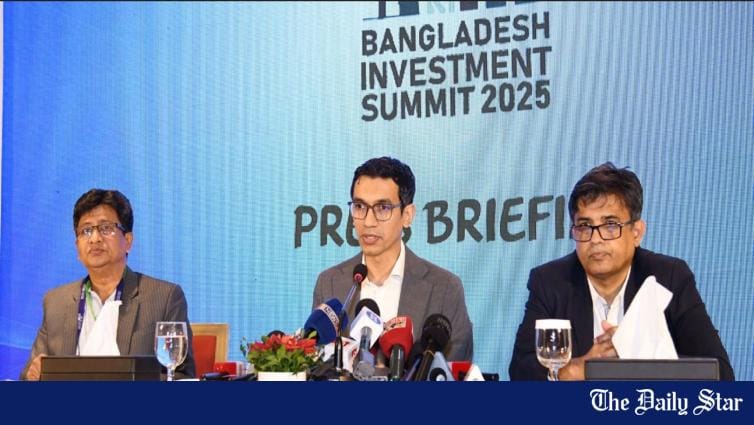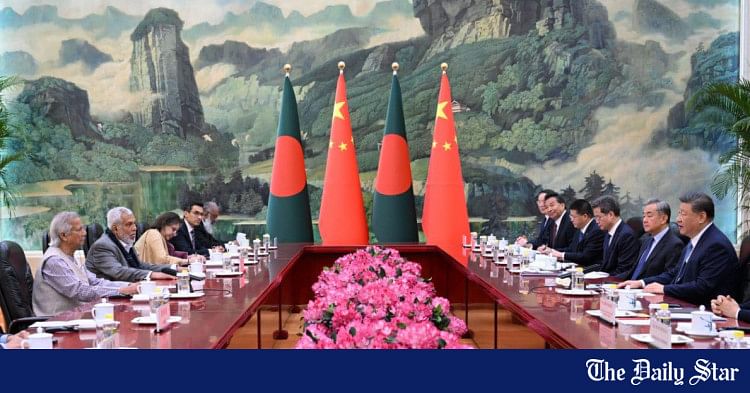How our youth can leverage Bangladesh-China ties
Recent bilateral dialogues between Chief Adviser Prof Muhammad Yunus and Chinese President Xi Jinping offer practical and significant economic benefits for Bangladesh’s youths. PHOTO: CA PRESS WING
The relationship between Bangladesh and China is neither recent nor purely political. It has been deeply rooted in history, friendship, and cultural exchange for over a thousand years. The historical connection dates back to the second century BCE, when Chinese envoy Zhang Qian of the Han dynasty emperor documented vibrant civilisations in Magadha, now a part of Bangladesh. Over subsequent centuries, Chinese Buddhist monks such as Xuanzang and Fa Xian travelled to this region seeking knowledge. Conversely, Bengali scholar Monk Atish Dipankar journeyed across the Himalayas to spread Bengal's spiritual and cultural heritage to China. During the 14th and 15th centuries, Bengal's sultans used to send regular diplomatic missions to China's Ming Dynasty, reciprocated by the Admiral of the Ming Navy Zheng He's historic voyages to Bengal. The Chinese referred to Bengal as "Pang-ge-la"—a name that evolved into today's "Meng-jia-la," the contemporary Chinese pronunciation for Bangladesh.
As Bangladesh and China celebrate 50 years of diplomatic relations in 2025, this enduring relationship stands on the firm foundation of centuries-old people-to-people bonds. During Chief Adviser Professor Muhammad Yunus's official visit to China, a joint press statement was released on March 28, 2025, to commemorate this significant milestone by declaring 2025 the "China-Bangladesh Year of People-to-People Exchanges." This initiative aims to deepen bilateral cooperation across various sectors, including culture, tourism, media, education, healthcare, youth exchanges, local government collaboration, and think tank partnerships. At this historic juncture, Bangladesh now has a strategic opportunity to leverage these strengthened cultural and interpersonal ties to unlock sustainable economic and social benefits—particularly addressing critical issues such as employment opportunities for youths through modern skill development.
Recently, research findings shared at a seminar titled "National Image of China in Bangladesh" showed overwhelmingly positive sentiment among Bangladeshis towards China in nurturing friendly relationships, sharing technological development, opportunities for higher education, medical tourism, and creating a strong trading partnership with China.
China is Bangladesh's largest trading partner, facilitating $16.63 billion in imports and just $715.37 million in exports to and from Bangladesh, respectively, in 2024. On the other hand, Foreign Direct Investment (FDI) from China to Bangladesh was $2.67 billion as of September 2024. Nearly 1,000 Chinese enterprises and multinational corporations operate in Bangladesh, creating tremendous employment opportunities.
In this context, youths in Bangladesh could further enhance their employment opportunities in Chinese enterprises and multinational corporations by acquiring practical knowledge of the Chinese language and culture, China-related studies, and technical education in various areas. The existing cooperation with China also opens up entrepreneurship opportunities for many youths—a path actively encouraged by Professor Muhammad Yunus, who consistently urges the youths to become job creators rather than job seekers. Such entrepreneurial efforts, enabled by fluency in Chinese and a deeper understanding of Chinese culture, could open new avenues of hope, economic empowerment, sustained career growth, and global opportunities for Bangladeshi youths.
Fluency in Chinese is more vital than ever. For people-to-people friendship and mutual prosperity, communication barriers must be overcome. Systematic Chinese language education, available through universities, Confucius Institutes, and specialised China Studies programmes, is a transformative tool. Nearly 20,000 Bangladeshi students are studying in China, and around 3,000 students are trained annually through two Confucius Institutes at North-South and Dhaka University, as well as one Confucius Classroom in Bangladesh. These can open significant career paths for youth, including employment opportunities in Chinese companies in Bangladesh, entrepreneurship linked to China's global market and Belt and Road Initiative, higher education and research opportunities in China, and participation in governmental and development projects under the Global Development Initiative framework.
Medical tourism is another significant emerging sector, notably strengthened by China's recent decision to designate hospitals in Kunming specifically for Bangladeshi medical tourists. Youths fluent in Chinese can capitalise on opportunities as medical interpreters, healthcare logistics coordinators, and medical tourism entrepreneurs.
Given this scenario, Bangladesh could benefit substantially from Chinese President Xi Jinping's vision of "mass entrepreneurship and innovation," emphasising the empowerment of ordinary citizens, particularly youth, to innovate, start businesses, and drive economic growth. The broader vision outlined through President Xi's Global Development Initiative highlights inclusive growth, poverty alleviation, and innovation. It perfectly aligns with Bangladesh's immediate needs. China's model of "Common Prosperity" and sustainable development, known as "Ecological Civilisation," echoes the vision of Bangladesh's Chief Adviser Professor Muhammad Yunus's concept of a "World of Three Zeros"—Zero Poverty, Zero Unemployment, and Zero Net Carbon Emissions. Leveraging ideas from both President Xi and Professor Yunus could become instrumental in addressing Bangladesh's youth unemployment crisis through innovation, entrepreneurship, and green jobs, ensuring "high-quality development."
Recent comments from Chen Huaiyu, chairman of the China Export-Import Bank (China Exim Bank), during the sidelines of the Boao Forum for Asia Annual Conference 2025, suggest even brighter prospects. Chen said that China Exim Bank is eager to support relocating Chinese manufacturing plants to Bangladesh, positioning Bangladesh as an export platform serving Southeast Asia, the Middle East, and beyond. Emulating the transformative experience of Vietnam, Bangladesh could substantially boost employment by attracting Chinese and other international manufacturers. This would necessitate improvements in Bangladesh's business environment—a goal already endorsed by Professor Yunus.
The commitments made by China during the recent bilateral dialogues—including plans for high-quality Belt and Road cooperation, modernisation of Mongla Port, joint development of the China Economic and Industrial Zone in Chattogram, and expedited negotiation of a Free Trade Agreement—offer practical and significant economic benefits for Bangladesh's youths. Furthermore, Bangladesh's active participation in global expos, such as the China International Import Expo and China-South Asia Expo, provides young entrepreneurs direct access to international markets. The joint press release also shows that China will import more goods than ever from Bangladesh. Partnership with China's steady and pragmatic development approach—built on non-interference, mutual respect, and a "win-win" cooperative approach—represents stability, growth, and hope. Embracing President Xi Jinping's vision of building a "Community of Shared Future for Mankind" gives Bangladeshi youths a unique opportunity to participate actively in global development and diplomatic efforts.
Just as historical figures like Zhang Qian, Fa Xian, Atish Dipankar, and Admiral Zheng He once illuminated paths between two great civilisations, today's youth stand at the threshold of a similarly profound opportunity—to become modern-day torchbearers of this timeless friendship. As 2025 marks the golden jubilee of diplomatic ties and celebrates the "Year of People-to-People Exchanges," it is not just a ceremonial milestone. It shows a beacon of immense promise. To truly grasp the rich possibilities, our youth and educational institutes must recognise that language and culture are not just fields of study. They are bridges of empowerment, keys to global understanding, and doors to lifelong prosperity. Thus, investing strategically in Chinese language and cultural education may become Bangladesh's most powerful tool, enabling its youth to craft a shared future of lasting harmony, boundless opportunity, and mutual development with China.
Dr Mostak Ahamed Galib is associate professor and director of cross-cultural communication & BRI research centre at the School of Marxism at Wuhan University of Technology in China.
Dr Bulbul Siddiqi is associate professor of anthropology and director of Confucius Institute at North South University.













































